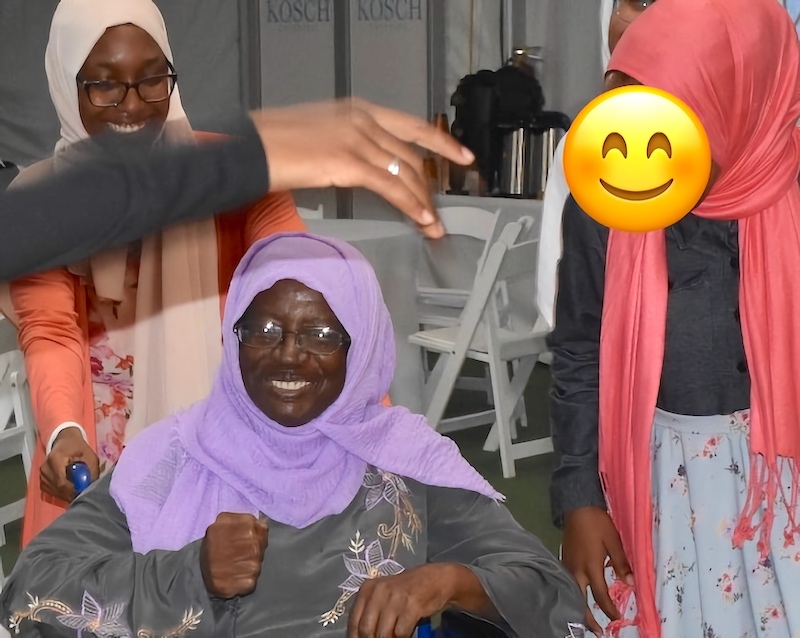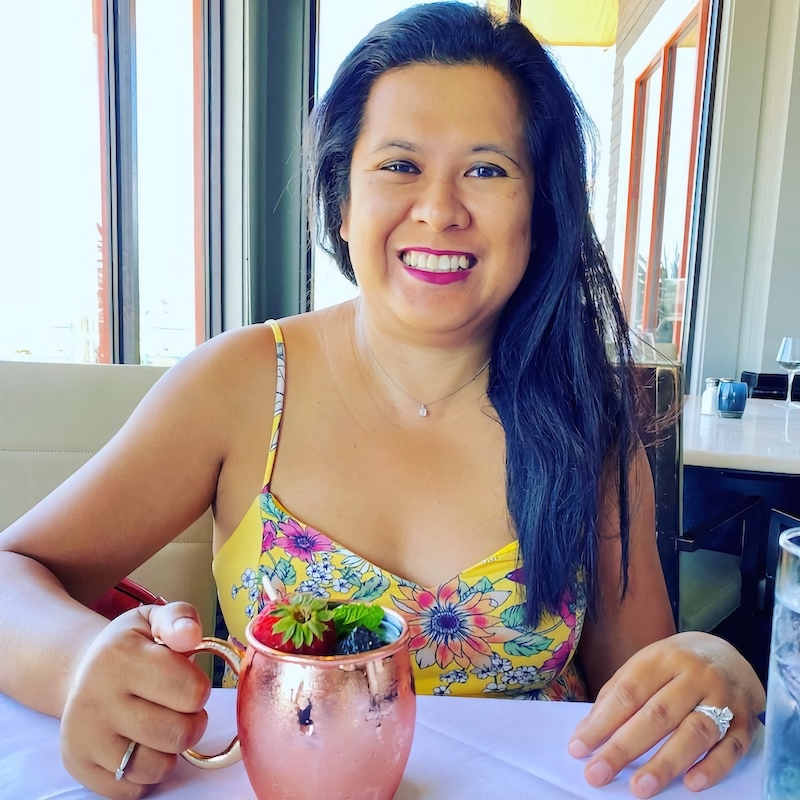Student Blog
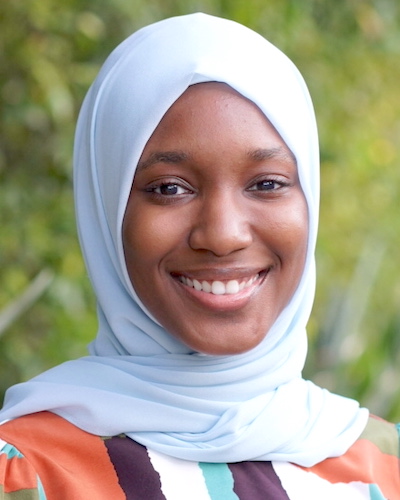
My Grandma and Why I Chose OT ⟩
September 23, 2022, by Aisha
Admissions Diversity What are OS/OT?
When my aunt first told me about OT, I was intrigued! I still didn’t quite know what OT was, but I liked the idea of a profession that considers a person’s mental and physical well-being. As a high school student, psychology captivated me because it emphasized the importance of mental health. At the time, I had concerns for my mental health and wellness. However, my mom was apprehensive about sending me to a therapist whose values didn’t align with ours. It was the catalyst that inspired me to strive towards becoming that person for people in my community. In college, my OS minor courses taught me how occupations could impact all aspects of an individual’s health.
I first witnessed the power of occupation with my grandma. She suffered a stroke several years ago, and I observed this lively woman, who loved to belly dance and cook, develop symptoms of depression and decline in function. I vividly remember bringing her to the dance floor at my cousin’s wedding. We were spinning around, dancing, and having a good time. From behind her wheelchair, I saw she was moving BOTH of her arms and raising them higher than she had in a long time! When I looked at the pictures later that evening, I saw the pure joy on her face. That picture reminded me how powerful meaningful activities could be in motivating people and supporting health and well-being.
After her stroke, my grandma was sent home from the hospital with no rehab services. The disparities in the healthcare system and the limited access to resources impacted her recovery. I want to help ensure underserved communities have access and the knowledge to advocate for resources/services. OT, a profession that holistically considers the person, their environment, and the occupation and focuses on what matters to the patient, is the perfect way for me to pursue that goal. I want to be that person my younger self and individuals like my grandmother needed while consistently practicing cultural humility and respecting unique cultures.
⋯
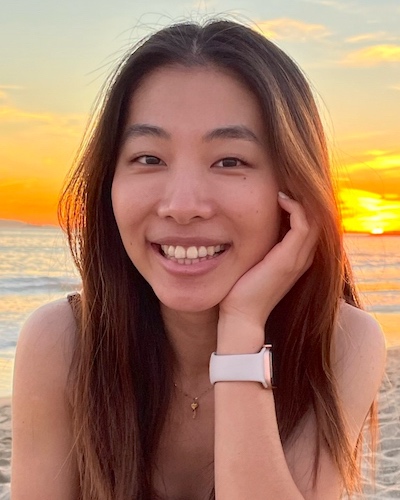
From Enemies to Friends . . . to Lovers: My Occupational Therapy Journey! ⟩
September 22, 2022, by Yoojin
Admissions First-Gen What are OS/OT?
(Spoiler: they fall in love at the end!)
When I tell folks that I’ve known about OT since before I even knew how to spell the words, they tell me how lucky I am to have discovered my passion at a very young age, especially in such a niche profession.
And don’t get me wrong, they’re totally right! I see how there is a perfect plan for me, part of which is to attend OT school to become an occupational therapist. However, like most people outside of the healthcare community who know what OT are: there’s a good chance it’s because they or a loved one have experience with receiving therapy services.
My love story with OT starts like this: OT wasn’t always a great passion of mine. In fact, at one point in my life I despised it so much I didn’t want to go into the healthcare field at all! (Here’s some context about me now: those around me can attest that OT is one of my favorite things to blabber about. In fact, someone I met recently asked, “So, is OT just like, your thing, Yoojin?” after I spent a good chunk of our conversation talking about my first Level II fieldwork this past summer. Well, maybe I should’ve dialed it down . . . he was a physical therapist after all 🤔).
Similar to a relationship between a pair of friends or lovers, it’s hard to remember the rockier parts of my relationship with OT because it’s at such a healthy state right now. But as I look back on my journey of grace, forgiveness, and love in my relationship with OT, I know it’s one that I really want to share. So here it goes . . .
I wouldn’t exactly say that I “discovered” OT, because that would imply that I was in search of something of the sort. Hm. So would it be more like I was “inescapably, involuntarily compelled into learning about OT”? That makes it sound like someone committed a crime against me. Well, that’s exactly how I felt throughout my childhood as a family member of someone who’s receiving OT services. I was too young to stay home alone, so I was forced to tag along. To almost every. Single. Appointment.
This meant I missed out on playdates and hanging out on the playground after class, both foolish, yet simple pleasures for a little selfish, elementary-aged Yoojin. But, I mean, why was I forced to play the third parent and the unpaid translator (shoutout to us first-gen children of immigrants!) rather than play tag or house? I cringe now at my shallow desires, but my years of frustration from holding such roles grew into a seed of bitterness in my heart toward OT and the clinic, the place where my childish dreams laid to rest. As much as I knew how much it strained my parents to be caregivers and parents, I pushed them away and continued to wallow in my self-pity.
It wasn’t until years later when it came to applying for college when things finally started to shift, and I took several weeks to reflect on what I really wanted to do. After countless talks with my mentors, late nights thinking, and tears spilled over wondering if I was destined to do nothing, I realized that OT was the only profession that I’d spent hundreds of hours observing and knew for a fact what I’d be getting myself into: a selfless, fulfilling, individual-oriented profession that works to improve the lives of clients by helping them achieve their personal goals.
During this time, my family and I exchanged so much grace and forgiveness. I fell more in love with OT as I rediscovered it on my own terms. Since applying and getting into the BS-MA (now the BS-OTD) program right here at USC, I’ve grown so much appreciation and love for this profession and never looked back. Love truly does conquer all! In my case, I was able to loosen my hardened heart filled with misplaced hatred for OT and foster it into a deepened empathy for my future clients’ needs. Give me all those cheesy pins and notepads that say “I ❤️ OT,” because I really, really do!
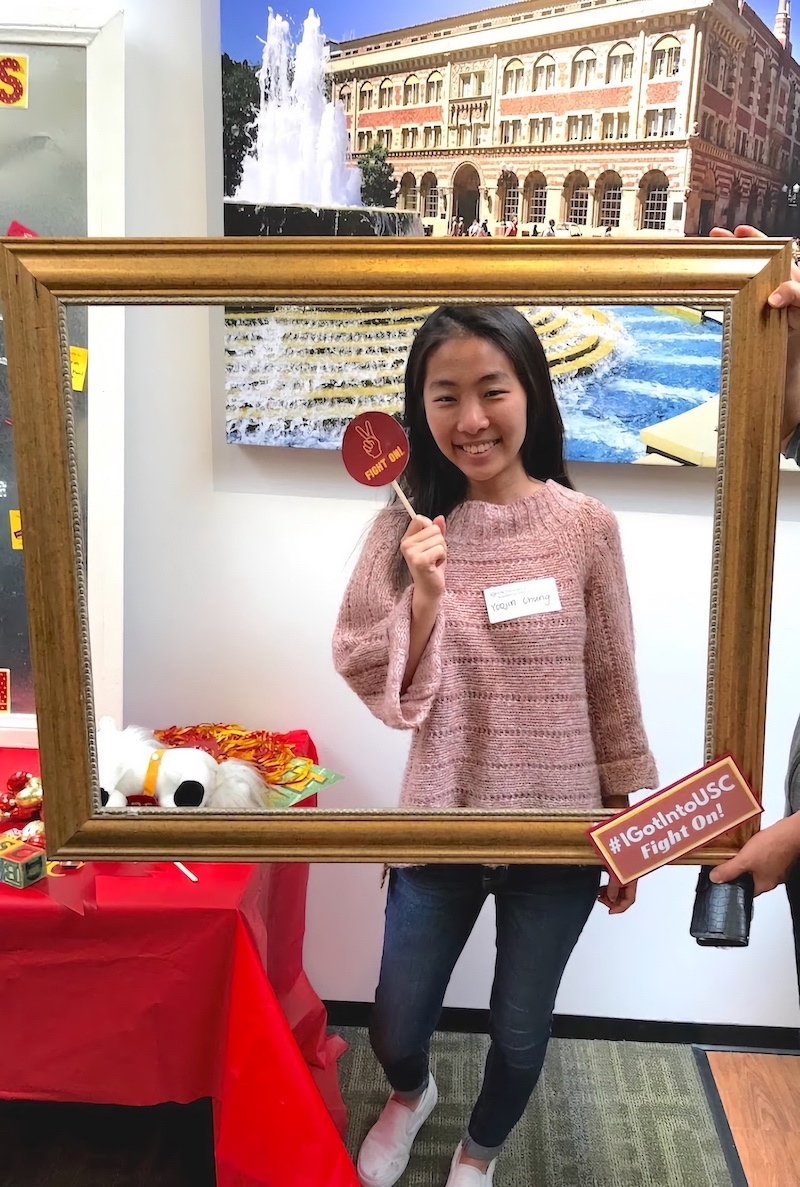
Me, over-the-world at the Admitted Student Reception in 2018!
⋯
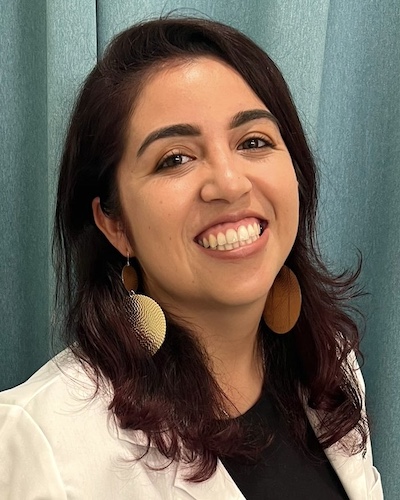
My road to OT and its many detours ⟩
September 15, 2022, by Tania
Admissions Diversity First-Gen School/Life Balance
Growing up, education was always seen as a privilege. I knew I needed to do something with my life but never knew exactly what that could be.
So, I decided to fully explore everything I was ever interested in because what better way to spend my 20s? I tried EMT, but the gender dynamics and the low pay made me run away quickly. I tried CNA in an attempt to be an RN, but the burnout is real. I moved to an oncology lab, but the hyper fixation of looking at cells didn’t last too long. My all-time favorite was working at a morgue performing autopsies, but to my surprise, I do enjoy working with people who are alive. Then I decided to be an internship and career advisor but reading resumes and talking to different corporations entail long working hours. I also created a small business decorating sugar cookies, but I had to pause because the repetitive movements of piping exacerbated my carpal tunnel pain. Finally, I was a university counselor and while I enjoyed helping students navigate higher education, something was missing. I loved all my previous jobs but none of them fully cover what I was looking for. I thought to myself if only there was one career that could allow me to be in health care, allow me to be creative, and allow me to teach . . .
It wasn’t until my grandfather had hip replacement surgery that I learned about OT. As his medical director, I approved an occupational therapist to come over for a home visit. The OT came over and guess what was the first thing she pointed out during the inspection? If you thought RUG, then you are correct! The rug in the living room was a tripping hazard. As she inspected the home, I took the opportunity to have a conversation with her about her job. I remember her saying “think of OT as a combination between a doctor and a teacher.” My brain immediately lit up! Oh, what! my two favorite professions in one? She had very convincing arguments regarding having a profession in OT because well here I am today. I am so glad for my journey because finding what you love and loving what you do is amazing.
I know the pressure of needing to figure life out, especially as a first-generation student, but I am here to tell you that taking a break in between undergrad and graduate school is fine, changing careers is fine, not getting all A’s in school is fine, and not knowing what specific area of OT you want to work in is fine! Don’t place extra stress on yourself thinking that you must figure every single detail out. I’ll let you in on a secret, no one has everything figured out in life, some are just better at pretending!
First-year students, you will have the next few years to decide what you would like to focus on and second-year students you will have your career to figure that out. Give yourself grace because being in grad school at USC is already stressful enough.
⋯
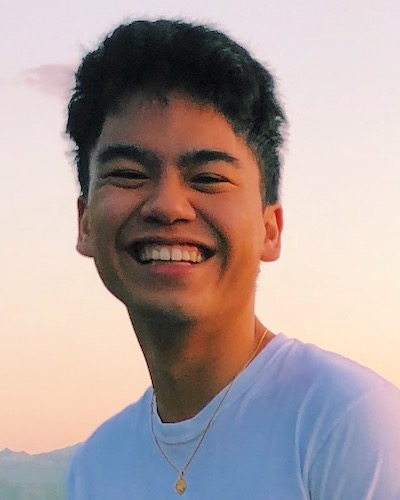
My Two Left Feet ⟩
September 13, 2022, by Bryan M.
Getting Involved What are OS/OT?
A common experience for burgeoning occupational therapists is the difficulty in explaining what OT is and why “occupations” are significant. Rather than giving you my “elevator pitch” definition, I thought I’d show you one of the ways I came to discover the superpower that is “occupation”.
Admittedly, I have two left feet. I am no dancer, and those closest to me can attest to that. Sure, I can find a rhythm, but you will never catch me impressing a crowd with my movement abilities. However, a key part of my undergraduate experiences, shaping me into the occupational therapy student I am today, was a dance performance that I took part in on USC’s largest stage in front of hundreds of people.
For context, I was a part of a student-run nonprofit organization in undergrad at USC called Troy Camp, which worked with elementary, middle, and high school students in the Greater Los Angeles Area, providing mentorship, leadership experiences, and academic support. Through this organization, I was able to put on a weekly creativity workshop for 3rd-5th graders at Vermont Elementary School. Modeling after a creativity-based course I took as a part of USC’s Occupational Science Minor, I developed a curriculum to provide an outlet for my students to express their creativity through mediums like filmmaking, dancing, engineering, crafting, and storytelling, among others.
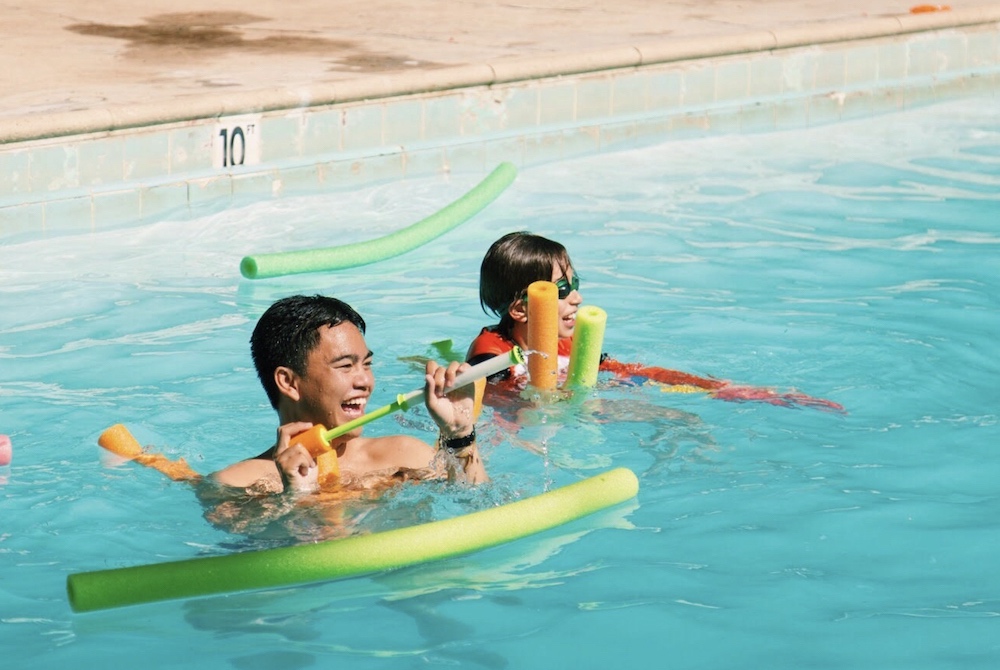
One of my campers and me at the pool during our summer camp
The ending event for this program was a live performance of Zedd’s “The Middle” in front of an audience at USC’s Bovard Auditorium, being a guest to one of USC’s premiere dance groups. The troupe came into the classroom to teach the students and counselors the choreography to the song, and then they gave us the opportunity to showcase our abilities at their yearly showcase.
I remember the night well, but what stands out the most was my interactions with one of my students, Vladimir. A bright, more reserved 3rd grader was attached at my hip for the night. When I first met Vlad, he showed a lot of apprehension and discomfort when exploring the various creative media. He did not feel comfortable expressing his creativity, and he had a lot of trouble connecting with his peers. However, over the course of the 5 months, his confidence had grown immensely, juxtaposing how timid he was when we first met. His attitude changed every week, with phrases like “I don’t want to . . .” turning into “When are we going to start?” Despite my own uneasiness in performing (because, as a reminder, I am not a dancer), Vlad’s newfound eagerness was heartening. We joined the rest of our group on stage, as Zedd’s “The Middle” came on through the speakers . . .
This experience, especially my work with Vladimir, serves as a testament to occupation. Vladimir’s disposition exemplifies how occupational opportunities can impact individual lives and inspires me to make my own mark in the field of occupational therapy. Though my program with Vladimir only lasted a year, I saw how his opportunity to engage in new creative occupations drastically improved his demeanor. I want to be an occupational therapist to empower individuals, especially those in marginalized communities, to live rich, fulfilling, meaningful lives, dancing alongside them with my two left feet.
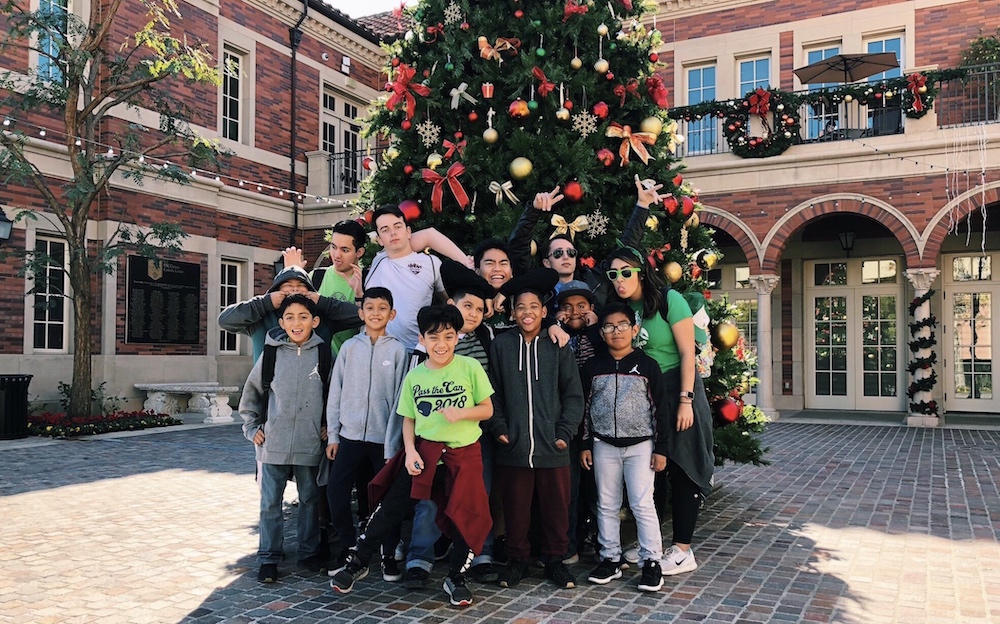
My Creativity Class in front of Bovard Auditorium after our dance performance
⋯
WOSC 2022: Redefining Inclusion Towards Social Transformation ⟩
September 12, 2022, by Global Initiatives Team
By Abby Khou, MA ’23
The inaugural World Occupational Science Conference was a gathering of occupational scientists, occupational therapy students, practitioners and educators, and members of the interdisciplinary world who have dedicated their lives to the work of social transformation through the knowledge from the body of work of Occupational Scientists. Held at the Sheraton Wall Vancouver Centre in Vancouver, British Columbia, one of the featured speakers at WOSC 2022 was Dr. Sridhar Venkatapuram, Associate Professor in Global Health and Philosophy at King’s College London and Deputy of King’s Global Health Institute and Director of Global Health Education. Dr. Venkatapuram spoke about the importance of values in science and promoting a capabilities approach that emphasizes quality of life, among other themes that set the tone for conference. Dr. Lilian Magalhães was another featured speaker, and is an adjunct professor at Federal University of São Carlos, Brazil and Associate Professor at Western University in Canada where she is Professor Emeritus. She highlighted her lifelong work in Occupational Science, her familial roots, and the commitment of Occupational Science to social transformation. The inaugural event was hosted by the University of British Columbia Occupational Science and Occupational Therapy and the International Society for Occupational Science.
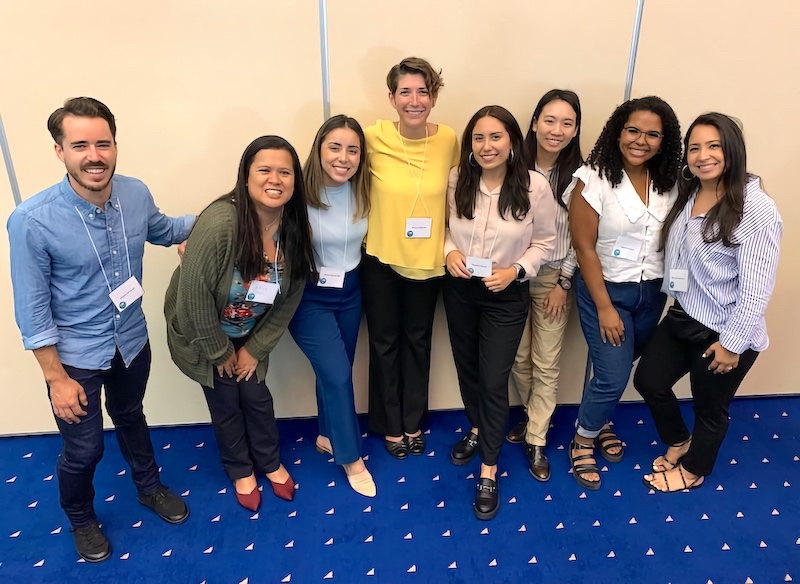
Adam Strizich, Abby Khou, Silvia Hernandez, Dr. Rebecca Aldrich, Daniela Flores, Yen Wen Pan, Kayla Brown, Monica Martinez
Our very own Dr. Rebecca Aldrich, Chair of the International Society of Occupational Science, along with Lisette Farias, Debbie Laliberte Rudman, Lilian Magalhães, Nick Pollard, and Roshan Galvaan, led a dialogic session entitled: Promoting an ‘unconference’ space for transformation of occupational science through critical dialogue. According to Farias et al. (2022), an “unconferencing” approach “prioritizes participation, reflection, and dismantling presenter-attendee hierarchies” (p. 4). By sitting in two concentric circles, the outer circle was able to actively listen as the inner circle addressed the question prompts and verbalized their thoughts. Participants spoke about Occupational Therapists and Occupational Scientists working hand in hand to achieve social change, the need for interdisciplinary involvement, and breaking away from traditional modes of communication such as research, to more grassroots initiatives such as those involving social media.
As a USC Chan second-year master’s student, a mother to a 6-year-old diagnosed with ASD and first-time conference attendee, I appreciated the themes of inclusion, play as occupation, belonging and the access of children to play and play spaces and the overarching theme of mobilization towards social transformation. There were a few presentations that particularly struck me, and further ignited my desire to advocate for a redefined sense of inclusion, the promotion of belongingness within the ASD community, and the awareness of play as occupation.
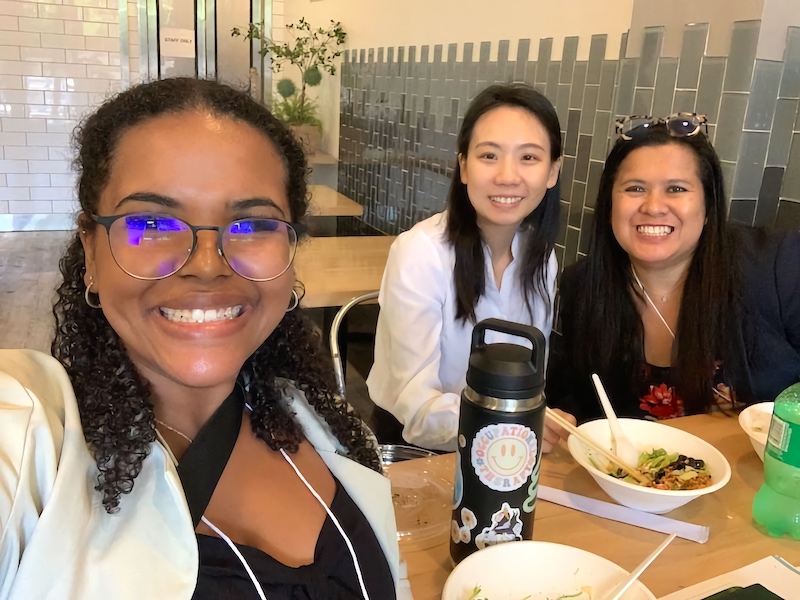
Kayla Brown, Yen Wen Pan, Abby Khou
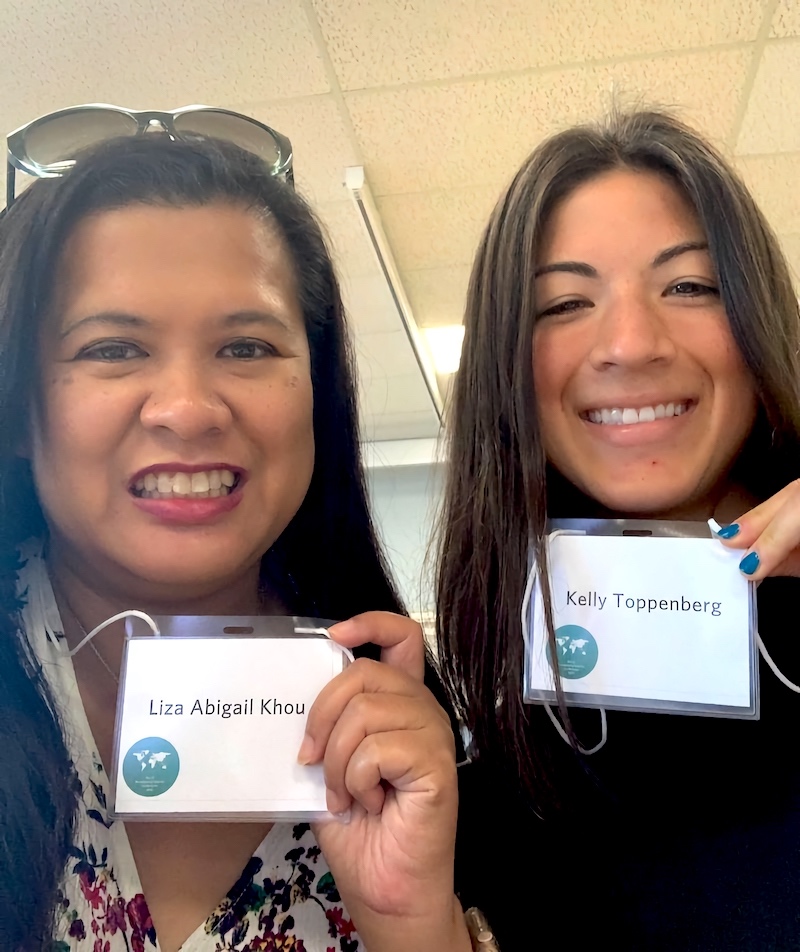
Abby Khou, Kelly Toppenberg
The passionate quality of the presentations on belongingness sometimes included tears, as presenters remembered their lived experiences of being a sibling to a disabled family member, or losing one’s cultural identity in the process of migration. I myself thought of my son Ethan while viewing “The Belonging Project: Conditions that support belonging for people with intellectual and developmental disabilities” presented by Paige Reeves, David McConnell and Shanon Phelan. I couldn’t help but share my own experiences as a member of the special needs parents community, sometimes being caught up in the pursuit of “services,” filling up my son’s schedule with therapy and appointments. “The Belonging Project” made me stop and think: does inclusion also result in exclusion if our idea of inclusion is for children to be included in manufactured spaces that we have created for them? Must we take away the agency of disabled children and plan out their days for them without consideration of where they truly want to be and who they desire to connect to? Is there a need to redefine the theory surrounding inclusion, mobilizing to translate into practice as we begin to chip away at the iceberg of social transformation? Reeves began her presentation quoting Reinders: “We create space and include people with [intellectual disability] as citizens . . . but do we also include them in our lives as human beings?”
The very definition of inclusion was questioned across different related presentations. The idea of having a “façade of inclusion,” that is, convincing ourselves as practitioners and caregivers of individuals with disabilities, that if we complete our checklists of the things we must do to advocate for our children’s inclusion, then our work is done. Comparing the façade of inclusion to the actual experience of being included was discussed in Paige Reeves, David McConnell and Shanon Phelan’s presentation: “The (radical) role of belonging in expanding and shifting understandings of social inclusion.” The Occupational Science perspective that the team was advocating for was a “paradigm shift” into a “meaningful involvement of disabled children’s voices.” What comes to mind is pediatric interventions that are child-led, respectful of families’ perspectives and culture, and the act of simply and truly listening in however way possible to the children when they communicate with us whether by verbal or by behavioral expression.
There is so much more to unpack from WOSC 2022 that I may not be able to express in this medium. I attempted to encapsulate such a wide and varied experience in the blog medium, but not quite able to represent all the meaningful experiences that I had at WOSC 2022. I had so many great and profound conversations and met so many wonderful people. As I moved from the conference back into my everyday life in my intersectional roles, I was filled with so many great ideas, a desire for social transformation and a further igniting of my passion for Occupational Science and Occupational Therapy. Maybe I left with more questions than answers, but that can be a good thing. Questions can lead to answers and answers can lead to solutions, and hopefully, continuing change.
References
Farias, L., Aldrich, R., Laliberte Rudman, D., Magalhães, L., Pollard, N., & Galvaan, R. (2022, August). Promoting an ‘unconference’ space for transformation of occupational science through critical dialogue [Dialogic session]. World Occupational Science Conference 2022, Vancouver, BC, Canada.
Reeves, P., McConnell, D., & Phelan, S. (2022a, August). The belonging project: Conditions that support belonging for people with intellectual and developmental disabilities [Paper presentation]. World Occupational Science Conference 2022, Vancouver, BC, Canada.
Reeves, P., McConnell, D., & Phelan, S. (2022b, August). The (radical) role of belonging in expanding and shifting understandings of social inclusion [Paper presentation]. World Occupational Science Conference 2022, Vancouver, BC, Canada.
⋯






